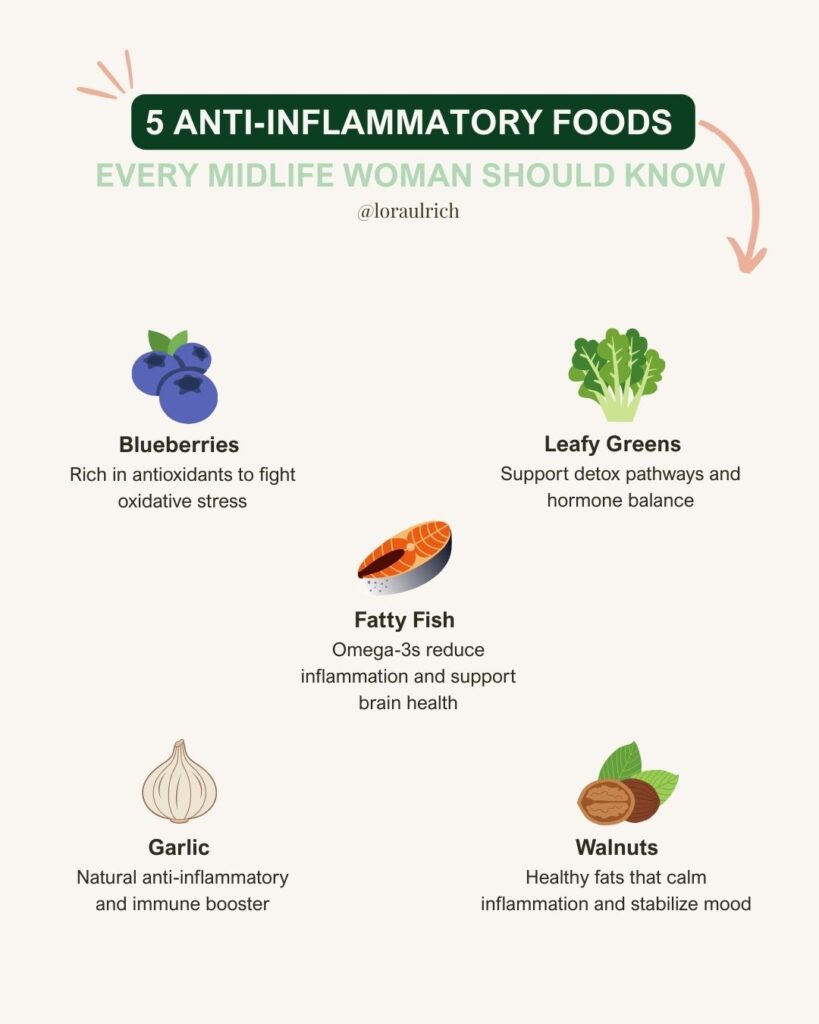Menopause bloating isn’t just about what you eat. As a menopause health coach, holistic nutritionist and metabolism specialist, I’ve seen how bloating can signal something deeper, such as hormonal shifts, stress patterns, and lifestyle rhythms that no longer serve your changing body. It’s not just uncomfortable; it’s your body’s way of asking for a reset.
If you’ve already tried adjusting your diet and still feel bloated, you might want to explore these lesser-known strategies. I covered foundational strategies in this blog post, but today, let’s go deeper.
Here are five surprising reasons menopause bloating might be showing up, and what you can do to feel better.
1. Stress that lingers in your body
Natural remedies for menopause bloating often overlook the role of chronic stress. Cortisol can slow digestion, increase inflammation, and cause water retention, especially in midlife.
What to do:
Try breathwork before meals, prioritize sleep, and explore adaptogens like ashwagandha or holy basil (with your practitioner’s guidance). Your nervous system and gut are deeply connected, and sometimes, a little extra support can make a big difference. I often recommend my Stress Relief PeriMenopause Supplement, which blends saffron, ashwagandha, and lemon balm to help ease tension, promote calmness, and support emotional balance during midlife transitions. These ingredients aren’t just powerful during perimenopause, they’re also great for menopause and beyond, offering continued support for emotional well-being.
2. Sluggish Lymph Flow
Movement matters. When your lymphatic system slows down, fluid retention and bloating can increase, especially during perimenopause.
What to do:
Incorporate light movement like walking, rebounding, or dry brushing. Gentle practices such as yoga and Pilates can also support detox and circulation, calm the nervous system, and improving core strength. These are natural remedies for menopause bloating that help your body move fluid, release tension, and restore rhythm.
3. Circadian Rhythm Disruption
Your digestive system runs on a clock. Disrupted sleep or late-night meals can throw off your gut’s rhythm and lead to bloating.
What to do:
Aim for consistent sleep and mealtimes. Try finishing dinner at least two to three hours before bed to support digestion and reduce bloating.
4. Low Stomach Acid
Many midlife women assume bloating means too much acid, but it’s often the opposite. Low stomach acid can cause poor food breakdown and fermentation.
What to do:
Bitters before meals, diluted apple cider vinegar, or digestive enzymes may help. These natural remedies can support better nutrient absorption and gut comfort.
5. Unprocessed Emotions
Emotional holding patterns can manifest physically. The gut is often where we “hold” what we haven’t yet processed, especially during identity shifts in midlife.
What to do:
Journaling, therapy, or talking with a trusted friend can help release what’s been stuck. Emotional digestion is just as important as physical digestion.
Anti-Inflammatory Foods for Menopause Bloating

Adding anti-inflammatory foods to your daily routine can help calm bloating and support hormone balance. Think:
- Blueberries
- Leafy greens
- Fatty fish
- Walnuts
- Garlic
These foods reduce inflammation and support gut health.
Your Next Step Toward Relief

Menopause bloating isn’t just a nuisance, it’s a signal. Your body is asking for rhythm, nourishment, and deeper attention. These triggers may not show up on a food label, but they’re part of the bigger picture of midlife wellness.
If you’re ready to explore more hormone-friendly strategies, grab my free guide: Quick & Easy Metabolism Boosting Recipes.

And if you’d like personalized support, book a free clarity call. I’d love to help you map out your next steps.
FAQs
How do I know if my bloating is hormone-related?
If your bloating fluctuates with your cycle, worsens during stress, or appears alongside other menopause symptoms like sleep disruption or mood changes, hormones may be involved. Tracking your symptoms and working with a practitioner can help clarify the root cause.
Can menopause bloating be linked to gut microbiome changes?
Absolutely. Estrogen influences gut bacteria diversity. As levels decline, the microbiome can shift, leading to increased gas, bloating, and food sensitivities. Probiotic-rich foods, prebiotic fibers, and stress reduction can help rebalance the gut ecosystem. For added support, this supplement brings together probiotics, digestive enzymes, and stress-balancing nutrients in one easy formula.
How long does menopause bloating typically lasts?
It varies. Some women experience bloating during perimenopause and see improvement postmenopause, while others may have ongoing symptoms due to lifestyle or gut health factors. Tracking your symptoms and supporting digestion can help shorten the duration and intensity.
+ show Comments
- Hide Comments
add a comment